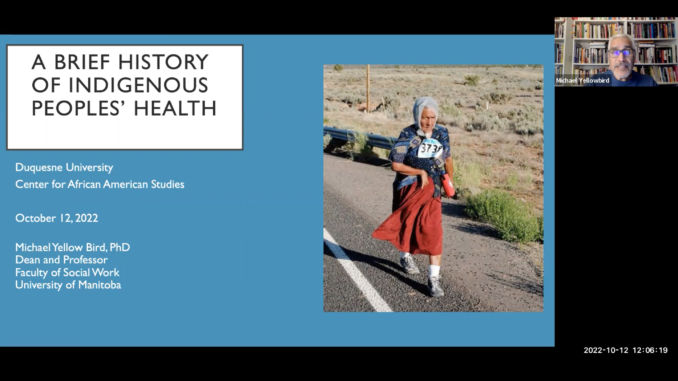
Alicia Dye | News Editor
Oct. 13, 2022
With Indigenous Peoples’ Day being marked this week, Duquesne University welcomed a member of the Mandan, Hidasta, and Arikara (MHA) Nation as a guest for the global health speaker series.
Michael Yellow Bird talked about the continuing disparity between U.S. citizens and Native Americans and the history of their health and healthcare.
“The IHS, Indian Health Services, spends around $4,078 per person as opposed to United States national health spending which is $9,726,” Bird said. “There are huge health disparities between U.S. citizens and Native Americans.”
Gerald Boodoo, Director of the Center for African Studies and associate professor of theology, opened up the discussion.
“We have attempted to highlight issues that are really underrepresented in this area,” Boodoo said. “Indigenous people’s day was Monday and we want to lift up indigenous voices and keep Indigenous people in the forefront of our minds.”
Michael Yellow Bird, Dean and Professor of the Faculty of Social Work at the University of Manitoba, and a member of the Mandan, Hidatsa, and Arikara (MHA) Nation in North Dakota, was the guest speaker.
Bird first focused on Indigenous health before colonization and brought up how Indigenous people were advanced with medical treatment at the time.
“The Inca used botanical medicines that could treat infections from wounds. Indigenous doctors could set broken bones.” Bird said. “Long before colonization, this was happening within Indigenous communities. As early as 9,000 years ago, there is evidence that Native peoples were using plants and fungi, known as entheogens today, for medicinal and spiritual properties. Today, doctors have successfully tested these entheogens for treating cluster headaches, depression, end-stage cancer anxiety and other forms of anxiety.”
Bird talked about how Europeans coming to the Americas changed Indigenous health as well.
“They [Natives] were in generally good health before Europeans came over,” Bird said. “The hugest change to happen to their health came when the Europeans landed in the Americas. They brought European diseases such as measles, smallpox, cholera and more. But the deadliest was smallpox.”
According to Bird, smallpox and other diseases killed 90% of the Indigenous population in the Americas, roughly 55 million.
The presentation also focused on modern-day Indigenous health and how there are many problems within the community and outside regarding health.
“Funding for IHS services has always been lacking,” Bird said. “Less immediate health issues are often neglected, due to funding shortages or to the lack of staff or equipment for on-site services. If you’ve got gallbladder issues and it’s not an emergency, you’re not going to get surgery until money is available from the federal government.
“If you’ve got breast cancer, and there’s not enough money, you cannot get service from the federal government. If it gets to the point where it gets dangerous, then maybe they can contract care and send people off the reservation to another provider who will do the surgery. So there’s a lot of neglect going on.”
Bird also focused on mental health within Indigenous populations, pointing out how they have higher rates of mental health issues.
Many Indigenous people have higher rates of mental health disorders and psychiatric diagnoses such as post-traumatic stress disorder, substance use disorder and suicidal behaviors compared to other ethnic and racial groups, according to Bird.
About 19% of the Native population of the United States reported having a mental illness (over 827,000 people), according to Bird.
“Suicide rates are extremely high. Death by suicide is five times higher within Indigenous communities compared to other groups.” Bird said.
Bird lastly focused on cultural differences within the Indigenous population related to health concerns and beliefs.
“Some believe western evidence-based treatment may work with Indigenous people, while others may not,” Bird said. “Some prefer traditional healing over Western approaches.”
Russell Walsh, associate professor of psychology at Duquesne, wanted students who joined in on the session to gain a greater knowledge of Indigenous health.
“I hope that those watching today have a much deeper appreciation for both the history of Indigenous people in the U.S., and of the current state of things regarding health care.”
